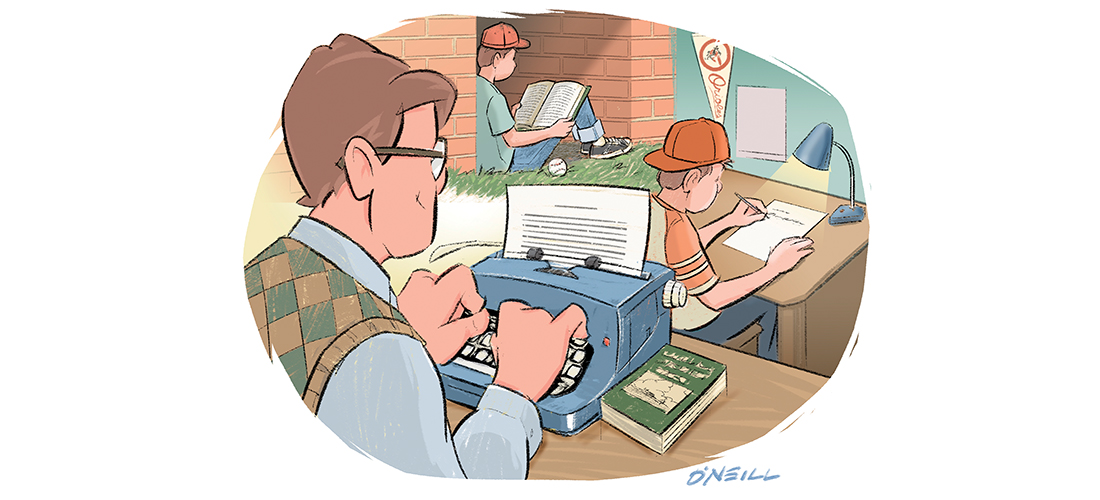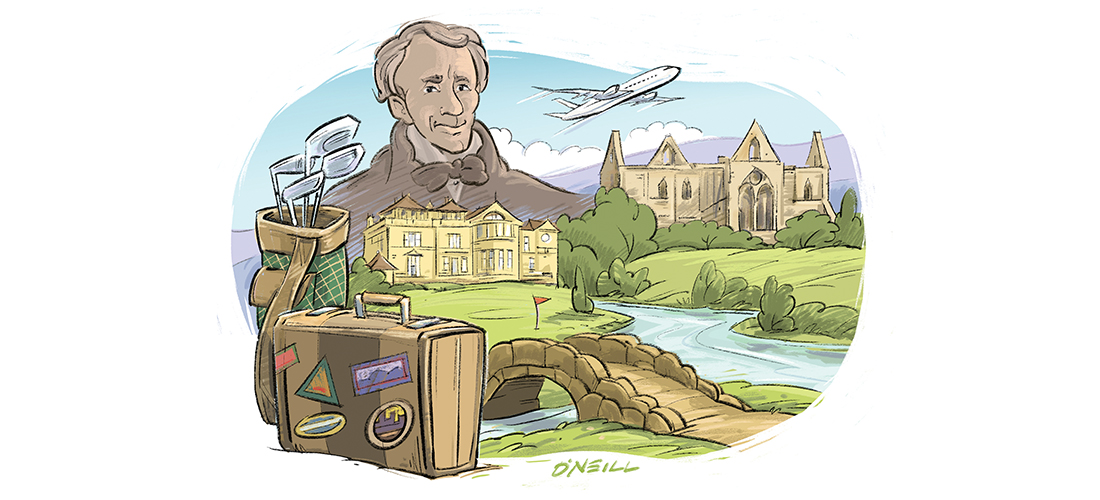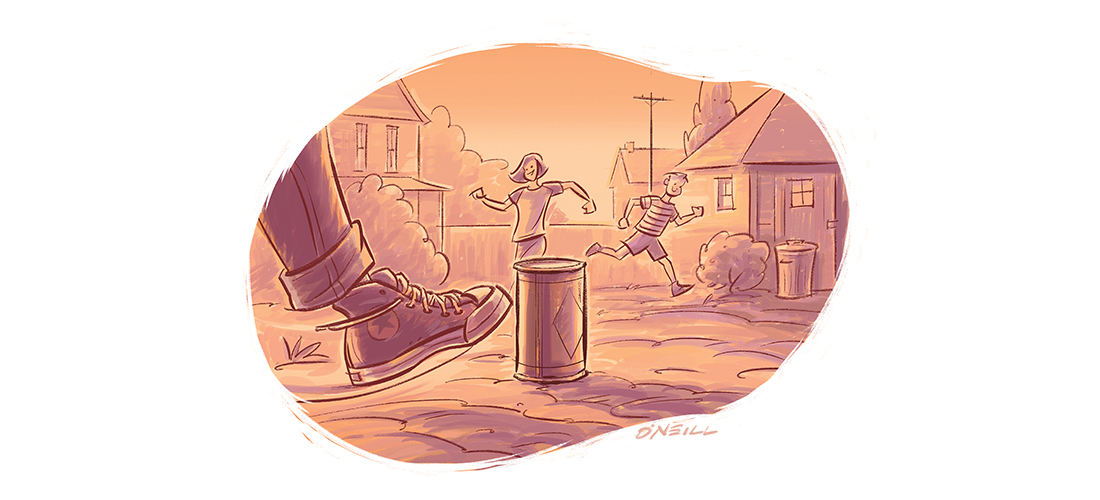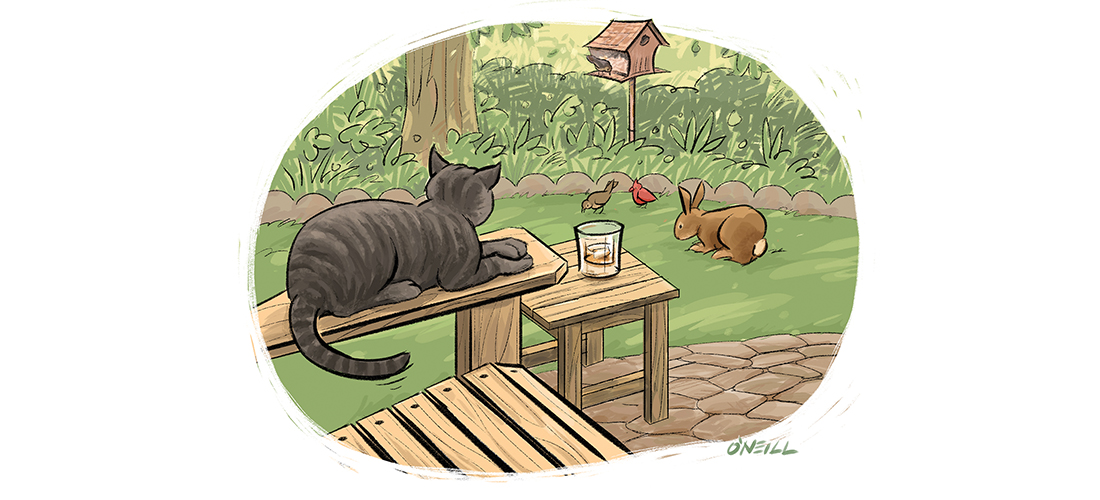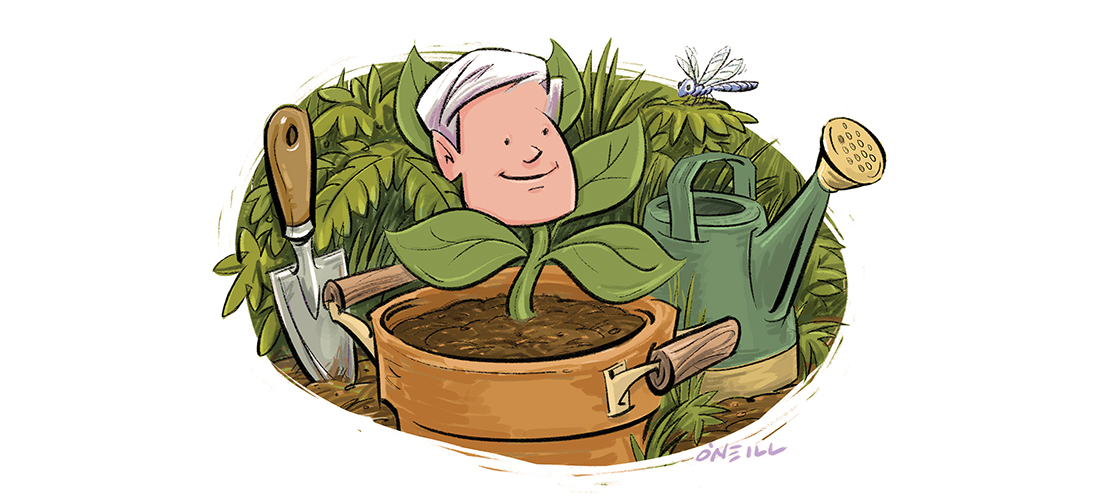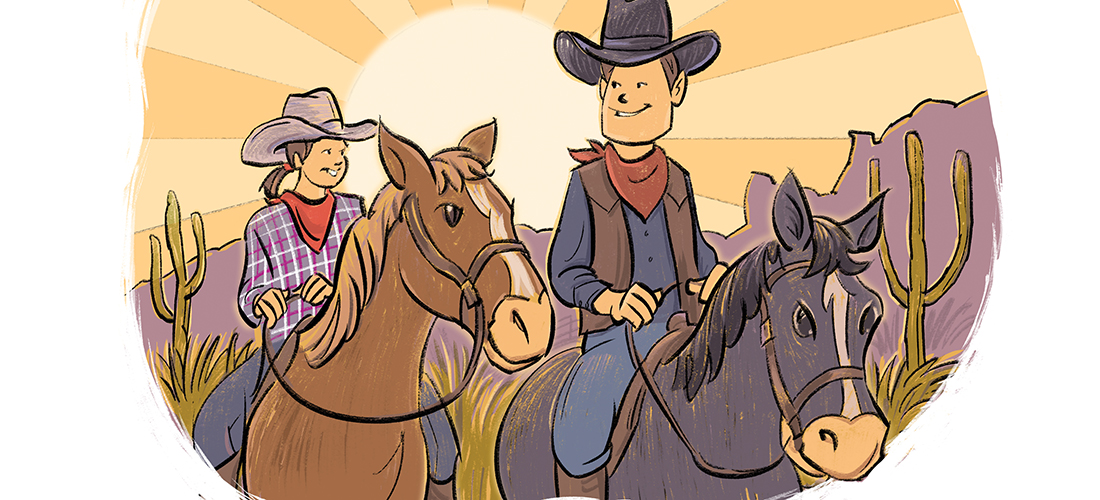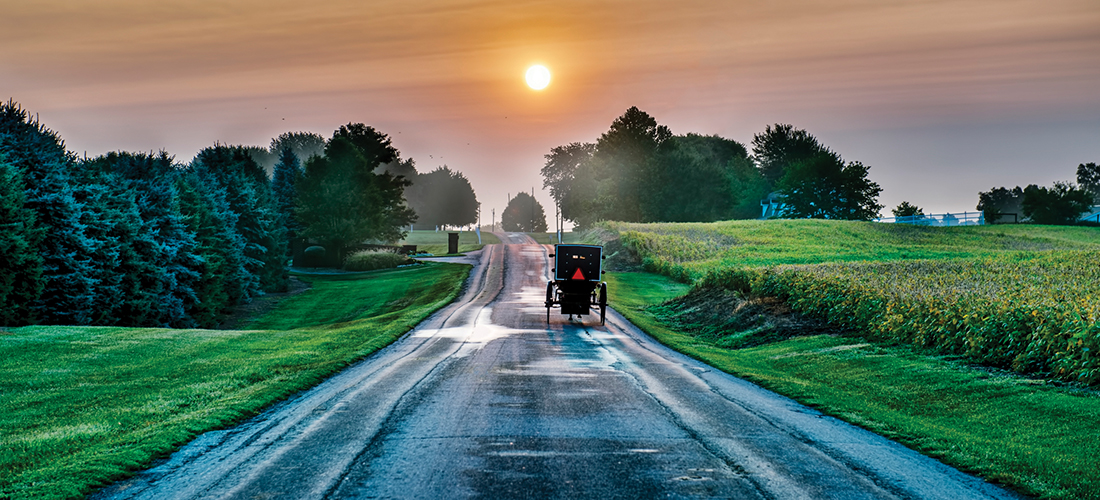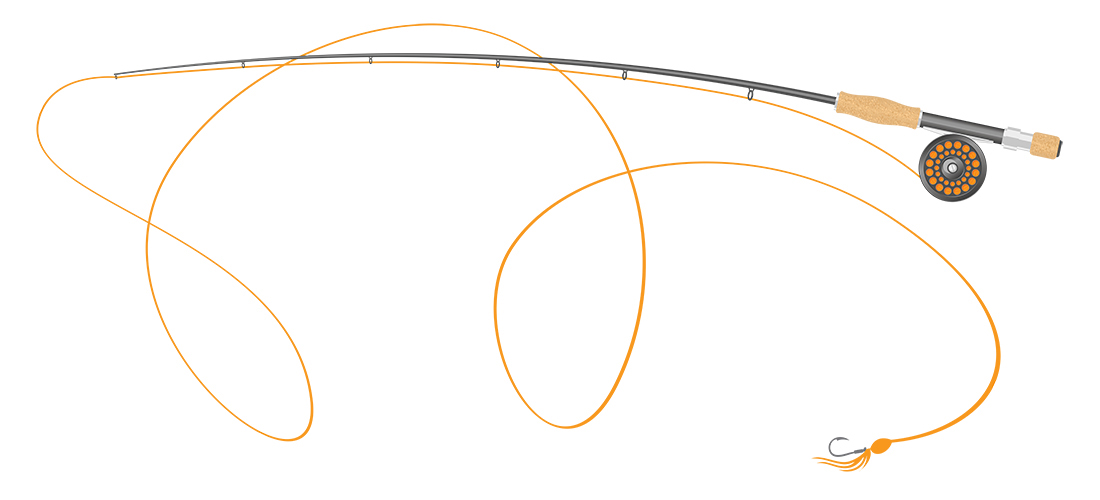Simple Life
Coach and The Bull: A Love Story
The road less traveled to authordom
By Jim Dodson
Illustration by Gerry O’Neill
Not long ago, following a speech to a historical organization in Georgia, I was asked by a woman in the audience how I became a “successful author.”
Anyone fortunate enough to publish a best-seller is likely to get some version of this question from time to time. That’s because almost everyone has a story to tell, a desire to have their voice heard in some form or another.
For years my response was to quip. “Because I couldn’t make a living out of mowing lawns in the neighborhood forever,” or, “The Baltimore Orioles already had a decent shortstop.”
The truth is, writing books is a lonely enterprise, and the vast majority of folks who are good at it invariably find their way to the craft via some other pathway.
Before literary success arrived, Charles Dickens worked in a factory putting labels on tins of boot polish. Harper Lee was an airline ticket clerk. William Faulkner served as a postmaster. Nicholas Sparks, a dental equipment salesman.
We were all, in other words, something else before we became writers. But dreamers all.
Why we choose to become writers and storytellers is perhaps the more interesting question — an age-old one, and a highly personal mystery that begs a more nuanced response.
In a famous essay titled “Why I Write,” George Orwell, of Animal Farm and 1984 fame, said writers put pen to paper out of “sheer egoism, aesthetic enthusiasm, historical impulse, and political purpose.”
Joan Didion claimed she wrote simply to discover what she was thinking — and feared — at the moment.
The allure of writing a successful novel that makes its author a household name is a dream of untold millions of struggling writers. “Everyone has a novel in them,” the late Christopher Hitchens sniffed, “and in most it should stay there.”
The truth is, writing anything is work that takes time, discipline, imagination, constant revision, false starts, new beginnings and plenty of patience. Hemingway called it the “loneliest, hardest art.” Though I suppose every artist in any medium can pretty much make the same claim.
One of my favorite writers, novelist Graham Greene, actually published a book called Why I Write in which he explained that good storytelling takes place in the unconscious before the first word is written on the page. “We remember the details of our story, we do not invent them,” he said — noting that ideas often come unbidden during unexpected moments of ordinary life — while dropping off your laundry, running errands, or (as in my case) mowing the lawn or working in the garden. This is why, regardless of how grubby I get in the flowerbeds, a pen and small notebook are always on my person. Everyone’s long journey to writing is different.
As the youngest son of a veteran newspaper man who hauled his family all over the 1950s South, I learned to read chapter books around age 4, in part because I never had time to make real playmates in the sleepy towns where we lived before moving again. From my parents’ bookshelf (both dedicated readers), I was drawn early to adventure storytelling, particularly the short stories of Rudyard Kipling, Greek myths, and any tale that involved animals and magical places. Fables and folktales ranked high. Absent a flying carpet, I often read books sitting in a large cardboard moving box on the porches of our old houses. And sometimes in the shady, cool dirt beneath the porch.
Inevitably, I grew up imagining someday becoming a journalist like my father, traveling all over the world to find such magical places. When he eventually introduced me to the essays of E.B. White — this was after reading Stuart Little and Charlotte’s Web — I even pictured myself someday living on a farm on the coast of Maine.
When I look back, I see a clear pattern of how I became a writer. Including an unlikely pair of school teachers who changed my life.
In a faraway October of 1969, I was a junior underclassman who landed in the American literature class of an aging spinster named Elizabeth Smith and — to my dismay — a newby math class teacher named Larry Saunders.
English lit and I were natural companions. But I detested algebra and was probably the slowest student in “Coach” Saunders’ class, a nickname we teenage geniuses were inspired to give him due his skinny, geeky frame and non-athletic orientation. By design, I rarely took my algebra book home and only occasionally did my homework.
I don’t know what Miss Smith saw in me. She was short, round and half deaf. Her unflattering moniker was “Bull” Smith. This was her final year of a long teaching career that stretched back to the mid-1930s. I eventually learned that my father had been her student the year she graduated UNCG — then called Woman’s College — and began teaching.
Out of the blue, Miss Smith pulled me aside one day to urge me to enter the Gate City’s annual O.Henry short story contest which had been running since the 1920s — so named in honor of hometown boy William Sydney Porter. So, on a lark, I did. My simple tale was about visiting my quiet grandfather on his farm for several weeks one summer, not long before he passed away.
The story won first place, deeply shocking my sports pals. I dropped by Miss Smith’s classroom at the end of the term just to say thanks and wish her happy retirement. She gave me a copy of Robert Frost’s Complete Poems, and, in return, wished me a long and happy career writing books. I think I laughed. I was mowing lawns and playing pony league baseball that summer.
Larry Saunders was an even bigger surprise. Early on he realized that I would never a mathematician be — and proposed a remarkable compromise. If I never missed class, agreed to pay attention and try my best, he would agree to giving me a C-minus or better. I made the deal. Saunders was famous for writing daily inspirational quotes on the chalkboard. Once, the jokester in me managed to alter one of his quotes. “Familiarity breeds contempt” became “Familiarity breeds.” Even Coach had a chuckle. “Mr. Dodson is our budding literary genius,” he told the class, shaking his head. He was true to his word, however, when he could easily have submarined my GPA.
During my senior year, good fortune found me in Larry Saunders’ class again for geometry — which, shockingly, I found to my liking. Geometry became very useful when, decades later, I became an amateur carpenter like my father and grandfather, and I built my post-and-beam house on the coast of Maine with my own hands. I couldn’t have done it without geometry and Coach Larry. About the same time, I published my first book, which turned out to be an international bestseller. I always meant to write Larry and thank him.
In 1983 on my way to a job interview at the Washington Post from Atlanta, where I was the youngest senior writer at the oldest Sunday magazine in the nation, I stopped by the Greensboro Public Library to do some research and spotted — of all people — Miss Smith paging through a dusty travel atlas in the reference room.
“Miss Smith,” I quietly interrupted her work. “I don’t know if you remember me . . .”
She looked up and chortled. “Of course I do, Mr. Dodson. I have followed your career with great interest. I am very pleased that you are writing. I imagine fine things are ahead of you.”
I was at a loss for words, but thanked her and wondered what she was up to these days. “I’m off to the dusts of ancient Egypt!” she trilled. “One of those faraway places I always wished to see!”
Before we parted, I also thanked her for seeing something in me — and for the volume of Robert Frost. Within weeks, I would withdraw from the Post offer in favor of a senior writer position at Yankee Magazine, a job that shaped my career and life — and this very magazine.
Sadly, I never got to say thank you to Larry Saunders, who passed away in January 2021. “He loved teaching, playing the piano, and his nieces and nephews. He had a huge sense of humor,” notes his considerable obituary. He spent almost four decades teaching math, rose to head of the department and would inspire the creation of the annual Larry Saunders Excellence in Teaching Award dedicated in his honor.
A good coach — like a great teacher — recognizes a young person’s strengths and weaknesses, and strives to help them find the right path in life.
Larry Saunders was both. Thanks to his wisdom, I built a beautiful house, found my way to writing books and even fell in love with inspiring quotes.
Which is why I think of “The Bull” and “Coach” every October. OH
Jim Dodson is the founding editor of O.Henry.

